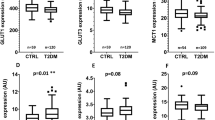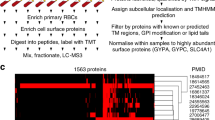Abstract
A new method for characterizing peptidases in terms of electrophoretic behaviour in starch gel and of substrate specificity is described. A survey of red cells from a large number of people has revealed genetically determined variants of two of these enzymes. Separate loci appear to be involved.
This is a preview of subscription content, access via your institution
Access options
Subscribe to this journal
Receive 51 print issues and online access
$199.00 per year
only $3.90 per issue
Buy this article
- Purchase on Springer Link
- Instant access to full article PDF
Prices may be subject to local taxes which are calculated during checkout
Similar content being viewed by others
References
Zamecnik, P. C., Stephenson, M. C., and Cope, O., J. Biol. Chem., 158, 135 (1945).
Adams, E., McFadden, M., and Smith, E. L., J. Biol. Chem., 198, 663 (1952).
Adams, E., and Smith, E. L., J. Biol. Chem., 198, 671 (1952).
Adams, E., Davis, N. C., and Smith, E. L., J. Biol. Chem., 199, 845 (1952).
Hachen, R. J., Biochem. Z., 334, 560 (1961).
Hachen, R. J., Acta Biol. Med. Germ., 11, 169 (1963).
Author information
Authors and Affiliations
Rights and permissions
About this article
Cite this article
LEWIS, W., HARRIS, H. Human Red Cell Peptidases. Nature 215, 351–355 (1967). https://doi.org/10.1038/215351a0
Received:
Revised:
Issue Date:
DOI: https://doi.org/10.1038/215351a0
This article is cited by
-
Production, active staining and gas chromatography assay analysis of recombinant aminopeptidase P from Lactococcus lactis ssp. lactis DSM 20481
AMB Express (2012)
-
Peptidase B polymorphism in cattle erythrocytes
Biochemical Genetics (1992)
-
Peptidase B polymorphism in cattle erythrocytes
Biochemical Genetics (1992)
-
Genetic polymorphism of human peptidase C, PEPC (E.C.3.4.1.1): formal genetic and population data
Human Genetics (1989)
-
Assignment of the complement serine protease genes C1r and C1s to chromosome 12 region 12p13
Human Genetics (1988)
Comments
By submitting a comment you agree to abide by our Terms and Community Guidelines. If you find something abusive or that does not comply with our terms or guidelines please flag it as inappropriate.



